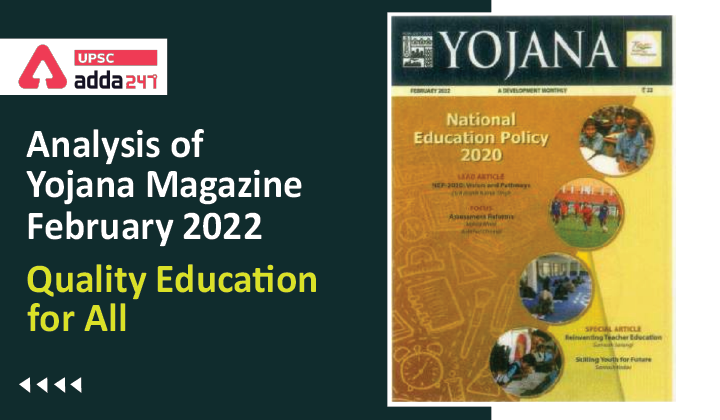Analysis of Yojana Magazine: Quality Education for All
Relevance
”GS 2: Education, Issues Relating to Development”
Introduction
- With the arrival of the National Education Policy (NEP)2020, the paradigm shift in the teaching-learning process from the traditional teacher-centred to learner-centric approach envisions to ensure the holistic development of students by accentuating their creative potential.
- The policy stresses on the core principle that education must develop not only the cognitive skills- both ‘foundational skills’ of literacy and numeracy, and ‘higher-order’ skills such as critical thinking and problem solving, but also social and emotional skills.
What is Quality education?
- It is a comprehensive term that includes learners, teachers, learning environment, appropriate curriculum, engaging pedagogy, learning outcomes, continuous formative assessment, and adequate student support.
- Quality is not merely a measure of efficiency but also has a value dimension. Attempt to improve the quality of education will succeed only if it goes hand in hand with steps to promote equity and inclusion.
Steps Taken by Government
- As Education is in the concurrent list of the Constitution, the Government of India through the erstwhile Centrally Sponsored Schemes of Sarva Shiksha Abhiyan (SSA), Rashtriya Madhyamik Shiksha Abhiyan (RMSA), and Teacher
Education (TE) has been aiming to enhance access, promote equity through the inclusion of disadvantaged groups and weaker sections, and improve the quality of education for all.
- The Central RTE Rules 2010, were amended on 20 February 2017 to include a reference on class-wise, subject-wise learning outcomes at the elementary level.
- Digital Initiatives: Given the importance of leveraging technology for enhancing teaching-learning experiences as envisaged in NEP 2020, the Government accords high priority to the provision of ICT labs and smart classrooms in schools at the upper primary to senior secondary level, which are supported under Samagra Shiksha. Smart classrooms and ICT labs have also been set up in the Kendriya Vidyalayas and Navodaya Vidyalayas.
- PM eVidya
It is a comprehensive initiative under Atmanirbhar Bharat Programme, which unifies all efforts related to digital/online/on-air education to enable coherent multi-mode access to education. It includes access to a variety of e-resources in 33 languages including Indian Sign Language over DIKSHA (One nation; One digital platform), Swayam Prabha DTH TV channels (One Class; one channel for class I to 12), Extensive use of Radio, Community radio, and Podcast- ShikshaVani. - PM Poshan Shakti Nirman
It is a right-based Centrally Sponsored Scheme under the National Food Security Act, 2013 and covers all children of Balvatika to Class VIII in Government and Government-Aided schools for the provision of supplementary nutrition at school. - VIDYA PRAVESH module for quality pre-education.
- SAFAL (Structured Assessment for Analysing Learning levels)
- Vidyanjali 2.0
A volunteer management programme; it will help the community/volunteers to interact and connect directly with the Government and Government-aided schools of their choice and share their knowledge and skills and/or contribute in the form of assets/material/equipment to meet the requirement of these schools.
- School Quality Assessment and Accreditation (SQAA)
The major recommendations of National Education Policy 2020 for enhancing the quality of school education
- Transforming Curricular & Pedagogical Structure-It recommends a new pedagogical and curricular structure of school education (5+3+3+4)
- Integration of Experiential Learning, Play-based, Sports-integrated, art-integrated, storytelling, toy-based pedagogies at all the stages of school education.
- Integration of Pre-vocational education into the curriculum from upper primary level onwards.
- Strengthening and universalisation of Early Childhood Care and Education (ECCE), and Foundational Literacy and Numeracy (FLN).
- Development of National and State Curriculum Frameworks for ECCE, School Education, Teacher Education, and Adult Education, which will integrate key 21st-century skills, mathematical thinking, and scientific temper.
- Reform in Assessment and Examination- Creating Holistic Progress Card.
- Enhancing quality of pre-service and in-service training of teachers.
- Tracking Student Progress for Achieving Learning Outcomes.
- National Professional Standards for Teachers (NPST) and National Mission for Mentoring (NMM) for teachers.
What Should be Done?
Curricular Material- The quality dimension needs to be examined from the point of view of the experience designed for the child in terms of knowledge and skills.
Linkages across levels of school education: Linkages between foundational, preparatory, middle and secondary levels in the processes of designing and preparing curricular material are vital.
Synergy- Setting up of structures that enable school teachers and subject experts drawn from institutions of higher learning to work together for revision of curriculum and development of learning material.
Innovative pedagogy- Every teacher needs to be given autonomy to choose the pedagogy relevant to her learners’ needs to make education more experiential, holistic, integrated, inquiry-driven, discovery-oriented, leamer-centred, discussion-based, flexible and, of course, enjoyable. Moreover, learning outcomes need to be seen as an integral part of pedagogy.
Assessment- Assessment is vital to track children’s progress in a continuous and comprehensive manner using multiple techniques. The shift is towards Competency-based learning i.e. children advance to the next level only upon mastering the current level of learning outcomes defined for each grade.
Conclusion
In order to encourage holistic development and 21st-century skills such as critical thinking, creativity, scientific temper, communication, collaboration, multilingualism, problem-solving skills, ethics, social responsibility, and digital literacy- the curriculum, textbooks, pedagogy, and assessment need to be transformed.



 TSPSC Group 1 Question Paper 2024, Downl...
TSPSC Group 1 Question Paper 2024, Downl...
 TSPSC Group 1 Answer key 2024 Out, Downl...
TSPSC Group 1 Answer key 2024 Out, Downl...
 UPSC Prelims 2024 Question Paper, Downlo...
UPSC Prelims 2024 Question Paper, Downlo...





